I want to start this off by saying that I am not a huge fan of romantic comedies. This isn’t because I find them beneath me or because of some internalized misogyny that has convinced me that “chick flicks” suck, it is because I’m simply not a romantic person. When it comes to whether the main character gets her man in the end and they live happily ever after, I truly do not care. What appeals to me about What’s Your Number? is that it actually has something to say about how society views and judges sexually active women (and the double standard that exists between men and women), as well as how woman-centric media publications perpetuate harmful stereotypes and gender roles.
Also, it stars the perpetually charming and hilarious Anna Faris (who I have loved since Waiting) and America’s Ass himself: Chris Evans, who is just as charming as Faris (and frequently shirtless).
Ally Darling (Faris) is the type of woman who will change herself for every new man in her life—a relationship chameleon, if you will. When we first meet her, she is sneaking out of bed with her current boyfriend Rick (Zachary Quinto) in order to make herself more presentable for him when he wakes up. It’s Beyoncé’s “Flawless” in action, except that Ally did not “wake up like this.” It’s all a show, and for what? Just so her boyfriend thinks she looks incredible in the morning? Newsflash: your partner should either think you’re lovely all the time or not care if you look a hot mess in the morning (because who doesn’t?). This idea that women have to constantly work behind the scenes to achieve some arbitrary level of physical perfection is so common, but What’s Your Number? presents this in a comical way. It tells us: hey, ladies, this is absolutely absurd. Never do this.
I don’t know any actual women who do the “I woke up like this” routine but I’m sure they exist somewhere. I do, however, know many women who—just like Ally—have shaped themselves to please and accommodate the current man in their life. Gillian Flynn speaks to this near-universal practice in Gone Girl’s iconic “Cool Girl” monologue:
Maybe he’s a vegetarian, so Cool Girl loves seitan and is great with dogs; or maybe he’s a hipster artist, so Cool Girl is a tattooed, bespectacled nerd who loves comics. There are variations to the window dressing, but believe me, he wants Cool Girl, who is basically the girl who likes every fucking thing he likes and doesn’t ever complain.
This describes Ally Darling to a T, right down to the tempeh sausage she cooks for Rick (a vegetarian) before he dumps her for the unforgiveable crime of asking him to be her date to her sister’s wedding. It’s clear that Rick did not take their relationship seriously; Ally was a glorified hook-up for him whereas she did everything she could to make it work. She wanted to be his Cool Girl and he just wanted to fuck. Not that there is anything wrong with casual sex between consenting adults, but the two partners need to be on the same page with things. When one strings the other along with ideas of a more serious relationship just so he can get laid regularly and wake up to freshly cooked tempeh sausage, it’s incredibly dishonest (and also just a dick move).
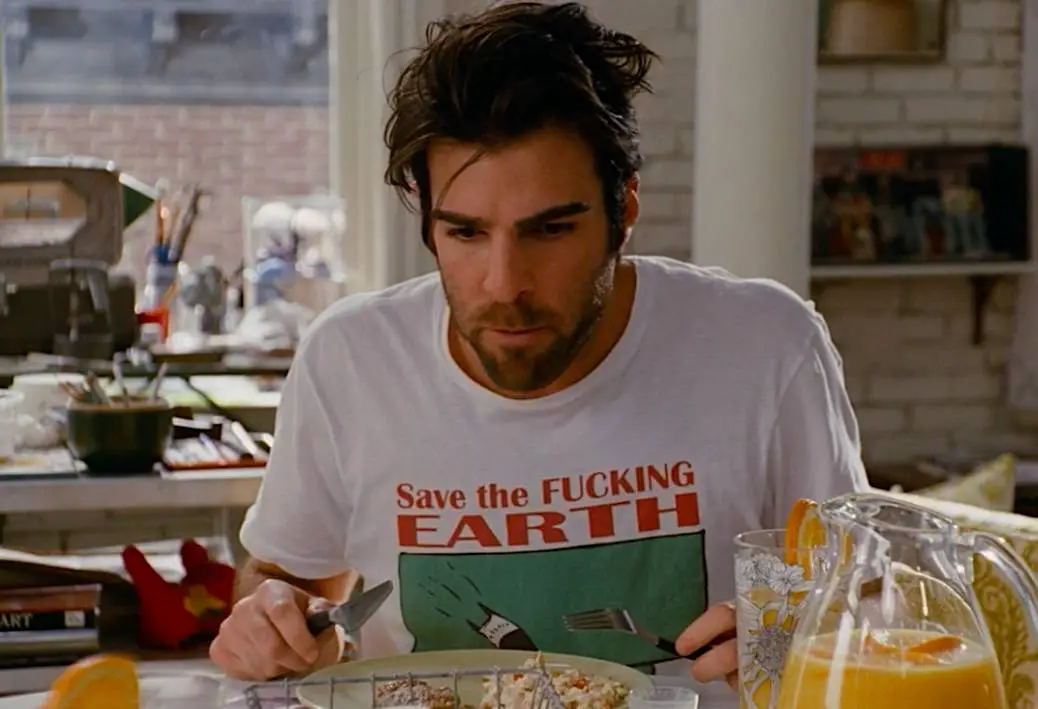
So Ally finds herself single yet again while her Little Miss Perfect younger sister Daisy (Ari Graynor) is on the verge of getting married. This is not a great position for Ally to be in self-esteem-wise, especially because Daisy is incredibly judgy and prudish when it comes to sex (and how much of it her sister has had). On top of the break-up, Ally also gets fired by her boss, Roger (Joel McHale). It’s a particularly rough day in the life of Ally Darling but she manages to soldier on and act cheerful and festive for Daisy’s engagement party, but not before she comes across an article in a woman’s magazine that asks the titular question: “What’s Your Number?”
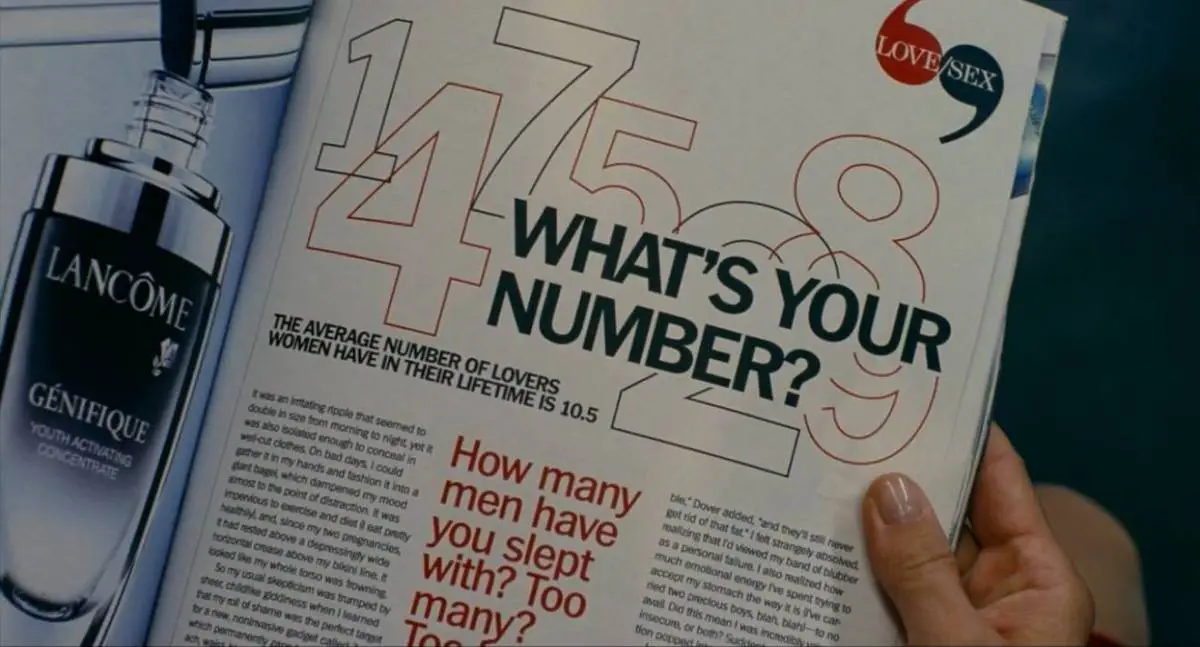
The article tells us that the average number of sexual partners a woman has in her life is 10.5, which comes as a bit of a shock to Ally since she has already exceeded that number. She decides to make a list of all the guys she has slept with in order to figure out what her number actually is, and after a while she calculates that she’s at 19. Ally’s number is something that had never occurred to her to care about until the magazine article implied that a high number is something that a woman should feel guilt and shame about. Ally may have been unhappy with the fact that she hadn’t found the right guy yet, but her discontent was never about how many men she had slept with. But now the article’s message has lodged itself firmly in her head, and this is what drives the plot of the rest of the movie.
One of the things that I love about What’s Your Number?—from the opening credits of the film, which is a montage of women’s magazine articles with titles directly referencing events to come in the story—is how it highlights the toxicity of women’s magazines. Because here’s the thing about “women’s” magazines: they are not actually targeted at grown women. The real market for these magazines is young girls, especially teenagers, who are in their formative years and trying to figure out what it means to be a woman.
If you ask any woman you know how old she was when she first picked up one of these magazines, I guarantee you it was somewhere in the tween years to the very early teen years. Knowing pretty much nothing of the world of womanhood just yet, we picked up these magazines and they told us what to wear and how to do our makeup and our hair—the things we actually wanted to know. But they also told us how to act and how to be the ideal woman (and that woman was almost always a white, blonde-haired, blue-eyed, skinny chick with big tits and a bubble butt). They told us what the ideal body was, and what to eat and how to exercise in order to achieve the “hot bod” that everyone was supposed to want.
Most relevant to What’s Your Number?, these women’s magazines told us about sex and the kind of woman we should be in order to please a man. They told us, as they tell Ally, that sex is acceptable (and fun!) but not if you have too much of it and only if it makes your man happy. It’s all a lot to take, even for an adult woman, but when you’re young and impressionable, those magazines send incredibly dangerous messages that you are not yet capable of looking at with a critical eye. What’s Your Number? mocks these magazines and reminds me, as a grown woman, how absolutely absurd they are and how naïve younger me was to think they were anything more than the glossy-magazine equivalent of clickbait.
Daisy Darling is basically a walking, talking woman’s magazine. As judgmental as she is, though, it’s clear from the beginning that she and Ally are very close and that they love each other despite their many differences. This is the only thing keeping the Daisy character from being completely insufferable. Ally loves her, so we have to at least tolerate her. What makes this incredibly difficult is that Daisy’s role (at least, for the majority of the film) is to echo what society has always tried to push on women. She’s Little Miss Perfect—perfectly dressed, coiffed, and made up—and obviously she’s Mommy’s Favorite.
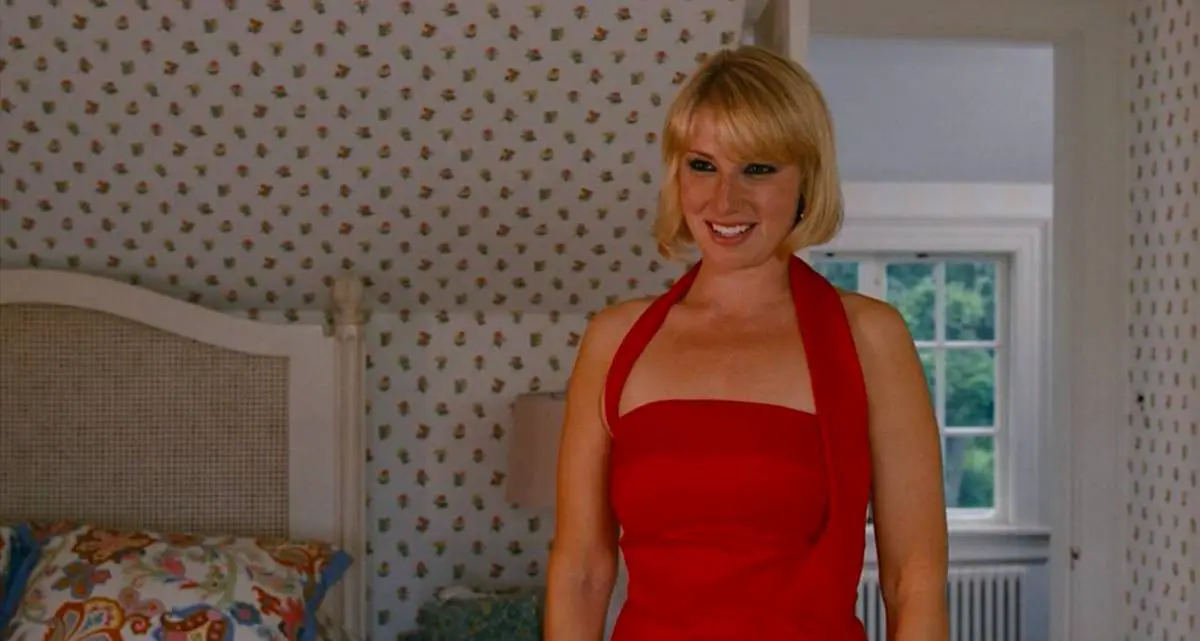
We meet Ava Darling (Blythe Danner) at Daisy’s engagement party at the Darling home. She is the quintessential WASP mother: she’s withholding, overbearing, and judgy, but she loves her children (although somewhat conditionally). It’s not that she doesn’t love Ally; it’s just that Daisy is the perfect one and Ally is the well-meaning fuck-up. Every family has one, right? While Ava has not given up on Ally completely, she is frequently embarrassed by her eldest daughter (case in point: the drunken toast Ally gives at the party).
Daisy’s friends—with the exception of Sheila (Eliza Coupe)—are even more judgy than she is. At a bachelorette night out that same evening, Ally decides that she needs a bit more context for her number so she gets the women to play a game designed to figure out where she stands among them. All the other ladies are in the single digits, but when the number 13 is drawn (Sheila’s number), they all make a big joke out of it, even going so far as to call her a “slut.” Sheila is seemingly unaffected by it all and one can assume that she’s been the butt of her friend’s slut-shaming jokes for a long time.
The most disturbing thing about the scene is that Ally feels pressured to join in on shaming Sheila and she tries (and fails) to change the number she has written down. She’s caught red-handed, though, and she admits to the group that she’s concerned about her number being too high. The worst part of it all is that the article claims that statistically women who have slept with over 20 people are unable to find a husband. Sheila has something to say about this that speaks to the theme of the film, making fun of the article and asking whether “the scientists at Marie Claire magazine” came up with those stats, but über-judgy friend Eileen (Heather Burns) points out that it was actually a study conducted at Harvard. But whether the statistics were just women’s magazine fodder or the result of an Ivy League study, the point remains the same: society is deciding for women exactly how sexually active they are allowed to be in order to achieve what is considered the ultimate goal—finding a husband.
There is so much wrong with this that I could write a tome about it, but I’ll just leave it at this: the idea that a woman who is sexually active is inherently undesirable to men, or that having a lot of sex is detrimental to a woman’s self-esteem, is a steaming pile of bullshit and the sooner everyone figures this out, the better off we will all be. Ladies: if a man cares about your number or judges you for it, run away. Also, not everyone’s goal in life is to find a husband. Shocking, I know. Ally, however, does want to get married one day and her younger sister’s upcoming marriage is likely contributing to her sense of urgency here. She makes a proclamation: she will not go above 20. The next guy she sleeps with will be the guy she marries. Of course, she immediately screws this up as she gets drunk and ends up sleeping with Roger, her ex-boss who just happened to be at the bar.
So now Ally has a problem on her hands. She is so desperate to stay under 20 that her only options for a husband include people that she has already slept with. Enter Colin Shea (Chris Evans), Ally’s neighbor who has a constant stream of women in and out of his apartment. Colin has zero shame about this (and lord knows what his number is but it is most definitely way above 20). Colin isn’t remotely concerned that his sexual activity will prohibit him from finding a wife when he decides he wants one, and you can bet his friends aren’t out there calling him a slut for sleeping with different girl every night. Colin just so happens to be an amateur private investigator and, in exchange for helping him get rid of some of the overnight guests who outstay their welcome, Ally enlists him to help her track down the guys on her list so she can find “the one.”
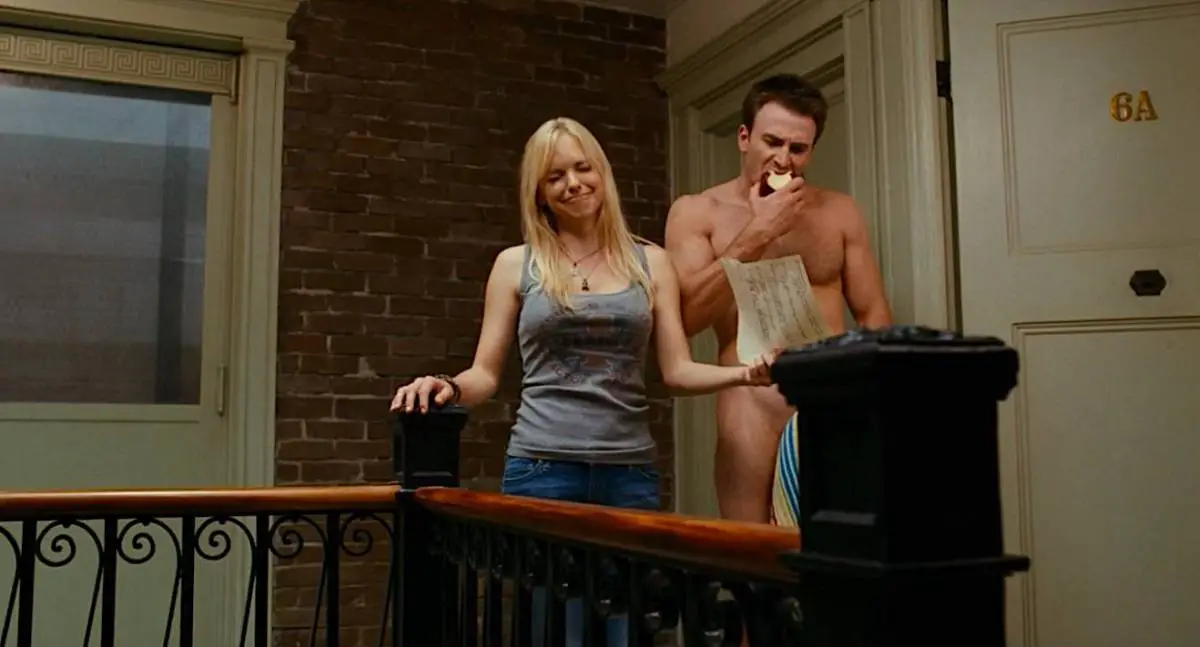
A large part of What’s Your Number? follows Ally’s various misadventures trying to reconnect with some of the former lovers that Colin has tracked down for her. We see, both in her present-day attempts and in flashbacks, the various ways she transforms herself in order to fit each guy. One particularly funny and cringe-worthy highlight is her attempt at reconnecting with Simon (Martin Freeman), with whom she pretended to be British (complete with her absolutely atrocious attempt at a British accent). Of course, because this is a romantic comedy, as Ally tries and fails to find a diamond in the rough of her past, she and Colin grow closer and fall for each other.
While initially she views Colin as a bit of a misogynist who uses and disrespects women, Ally comes to realize that he is not at all like that. To be fair, while there is nothing to indicate that Colin has made any sort of promises of commitment to his parade of lady friends, it is cowardly of him to hide from them the morning after instead of just being upfront about things. But this doesn’t make him a misogynist; it just demonstrates that he is a bit lacking in the communication department. Just because he has casual sex with a lot of women doesn’t mean that he isn’t emotionally available when he finds a woman he actually cares about—much in the same way that her sexual past does not dictate who she is and how worthy she is of love.
Colin demonstrates this in a number of ways, the most obvious one being that he is not even remotely concerned with Ally’s number; he actually finds her whole situation comical even though he agrees to help her. Ally is most interested in finding Jake Adams (Dave Annable)—the “one that got away”—but since he’s from a very rich and powerful family in Boston, Colin initially has a difficult time tracking him down. When he finally does, he learns that Jake is out of the country on business, so for the moment that seems to be that. Except that it isn’t, because Jake returns to town and contacts him but Colin decides to keep this bit of info from Ally.
At this point, Colin has fallen for her and they have been intimate, though they don’t have sex. One of the things that I love the most about What’s Your Number? is the way that the film handles the scene where Ally tells Colin she doesn’t want to go all the way. Even though they get almost right up to the point of no return, she stops him and tells him that she wants to slow things down. Colin doesn’t complain; he’s not angry. He doesn’t try to guilt her or convince her. He’s totally cool with it and respects her wishes. All he does is make a little “just the tip” joke and that’s that. This is what consent looks like, and it’s so incredibly refreshing to see it handled so well and so effortlessly.
Things take a turn when Ally finds out that Colin has been keeping the Jake Adams info from her. She is justifiably angry that he lied by omission and it cuts short the burgeoning romance between them. While Colin was in the wrong here, I can see why he did what he did. He believed that the two of them had something real and, while he hoped that Ally would no longer be interested in Jake, he believed that there was no way that he could compete with him. His insecurities wouldn’t let him be completely open and honest with her. We can’t know whether or not Ally would have chosen Colin over Jake at that point because she felt betrayed by him, and she lashes out at him harshly for it, reinforcing all his insecurities in the process.
And so she does end up with Jake Adams, for a while at least. Jake is the perfect guy on paper: handsome, philanthropic, rich, and the exact type of guy that will make Ally’s mother happy. Ava Darling is absolutely over the moon that her daughter has landed Jake Adams, and he ends up being Ally’s date to Daisy’s wedding. But as perfect as Jake may be on paper, Ally is still pretending to be someone she’s not when she’s with him. Ally is not Little Miss Perfect like Daisy; she is messy and chaotic and a little bit nuts—and all of that is okay. It’s who she is and she comes to realize that she can’t be herself with Jake, not in the way she always could be with Colin.
What finally solidifies this for her is finding out that Jake Adams is the type of guy who actually cares about her number. When she tells him she’s at 20, he thinks she’s joking and actually says, “Yuck.” Ally realizes that, not only can she not be herself with Jake, he actually would find her disgusting if he believed what she’d said. And so she does what any self-respecting woman should do in that situation: she realizes she deserves better, gets the hell out of Dodge, and seeks out the guy who actually loves her for her. What’s Your Number? ends with a very traditional rom-com-y sequence wherein Ally runs about the city in a bridesmaid dress, searching every wedding for Colin (whose band is performing at some unknown location). She finally finds him, apologizes, declares her love for him, and that’s that: he becomes number 21 and the movie ends with the sort of happily ever after that usually makes me roll my eyes.
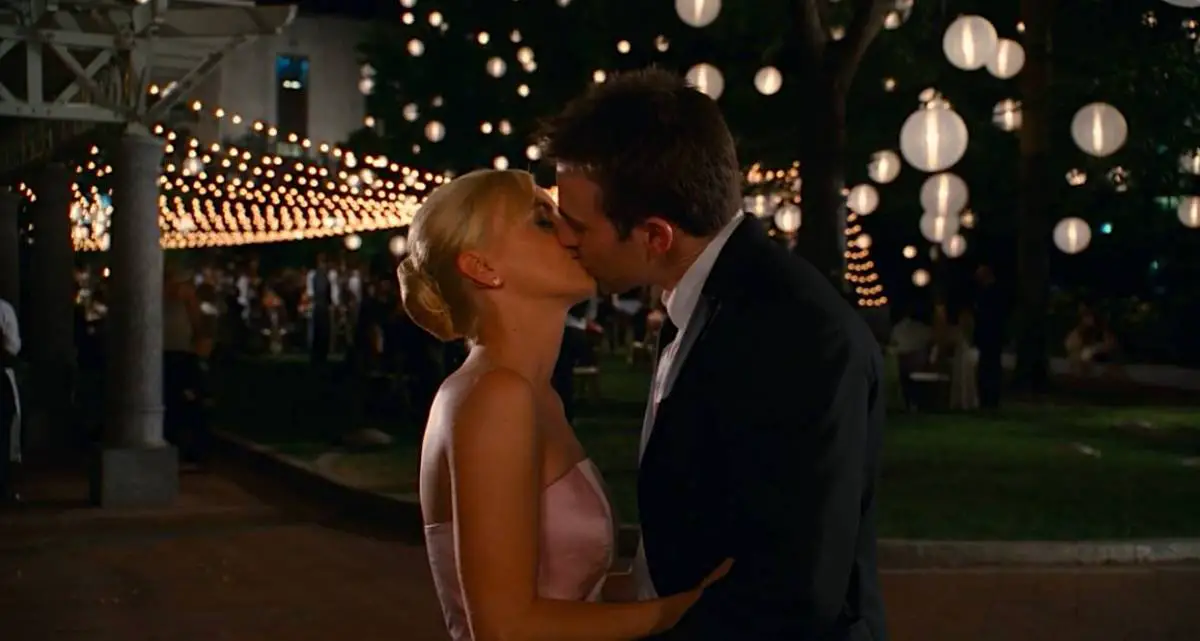
This one feels different to me, though, because it’s not about the heroine getting her man against all odds; it’s about Ally realizing that she doesn’t have to be ashamed of who she is or change herself for a man. She learns to love herself and in doing so, finds someone who loves her for who she actually is, not who she is pretending to be. And that’s all any of us can hope for, really—to reach a place where we accept ourselves and love ourselves. Ally doesn’t need Colin or any man in order to achieve self-love, but it never hurts to have a partner who reminds you that you’re pretty damn great just the way you are.
What’s Your Number? does not perpetuate the stereotypical idea that women must remain relatively “pure” in order to be considered ladylike. What it does so effectively is to take that idea, which is fed to us through the media and societal pressures from other women who have internalized this concept, and turn it on its head. It holds the concept of sexual purity up as something to be critical of and to reject. Ally Darling is our heroine and she has sex—some of it good, some of it bad—and that’s okay. Others may try to cut her down or shame her for it, but in the end she is the character we are meant to relate to. This is a story about a woman coming to terms with the fact that her life and her choices are her own and she has nothing to be sorry about. It shows us how sexually active women are shamed for exercising the freedom to do what they wish with their bodies while at the same time skewering the entire concept of slut-shaming. In the end, Ally comes to realize that it’s all a bunch of nonsense. It doesn’t matter if she has slept with one guy or one hundred guys—in the end, all that matters is that she has learned to love herself. Finding love in the process is just the icing on the cake.


